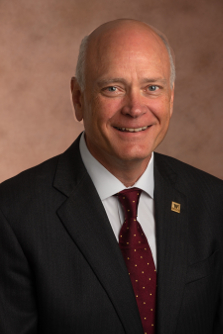
As his 10 years at the helm of WMed draws to a close this year, Founding Dean Dr. Hal B. Jenson took time to reflect recently on how the medical school – through clinical care and community service – has been a positive and transformative force in Kalamazoo and Southwest Michigan.
The last decade has brought with it a renewed focus on comprehensive patient-centered care. In 2019, the medical school’s clinical services, which includes more than 330 providers and care teams made up of resident physicians, experienced faculty physicians, advance practice providers, nurses and medical assistants, allied health staff, and students, transitioned to a new name – WMed Health.
“Great clinical care is centered on the patient, and we have to provide great clinical care in order to teach great clinical care,” Dr. Jenson said. “Our continual striving for excellence is part and parcel to being a great institution. The changes we’ve made over the last few years have had a significant impact on elevating the quality and efficiency of our clinical activities.”
Dr. Jenson said one key tool that will help enhance patient care and clinical research at WMed Health is a new Practice-Based Research Network (PBRN), which is being spearheaded by the medical school’s department of Biomedical Informatics and Dr. Philip Kroth, who chairs the department.
Dr. Jenson said the evolution of the PBRN will allow WMed faculty and resident physicians to conduct important quality improvement and clinical research by facilitating access to electronic health records and data to answer important clinical questions.
“The research network will streamline the ability of our investigators to answer questions and use big data to answer important medical questions,” Dr. Jenson said. “It has huge potential for the medical school.”
Even more, Dr. Jenson said the medical school has been able to broaden the reach of its clinical services and WMed Health over the last 10 years, expanding beyond the Oakland Drive Campus, Ascension Borgess, and Bronson Health. Today, WMed Health physicians and care teams also see patients at the Family Health Center in Kalamazoo, Grace Health in Battle Creek, WMed Health – Mall Drive Portage, as well as recently developing a new Orthopaedic Spine Surgery practice at Bronson Battle Creek.
“Family Health Center and Grace Health are federally qualified health clinics that serve the needs of historically underserved populations. This puts our physicians in venues where they can play direct and meaningful roles in meeting the needs of those patients,” Dr. Jenson said.
In addition to the growth in clinical services and the renewed focus on top-notch patient care, Dr. Jenson said WMed leaders and others in the medical school community have not forgotten about the importance of community engagement.
“A key element of our vision statement as an institution is to be distinguished among medical schools throughout the country by our engagement and collaboration in the community,” he said.
Dr. Jenson said community service and a genuine focus on giving back is integrated in the undergraduate medical education curriculum at WMed from day one under the leadership of Dr. Cheryl Dickson, associate dean for Health Equity and Community Affairs. Under Dr. Dickson’s guidance, all first- and second-year students take part in a curriculum component known as Active Citizenship, a service-learning educational opportunity for the students to partner with a community organization to provide service and to learn important skills in advocacy, leadership, and communication while gaining valuable understanding of the impact of the social determinants of health.
This past year the medical school has implemented the WMed Volunteers program, which gives every employee time to volunteer and serve in the community. This program connects each employee individually, and WMed collectively, with the community and helps meet community needs.
Additionally, Dr. Jenson said WMed supports faculty who have stepped into several key leadership roles to help meet needs in the local community and also at the state level. Among those leadership roles are:
- Dr. William Fales, professor in the department of Emergency Medicine, who serves as medical director for the Michigan Department of Health and Human Services Bureau of EMS, Trauma and Preparedness.
- Dr. William Nettleton, assistant professor in the department of Family and Community Medicine, who serves as the medical director for Kalamazoo County Health and Community Services and the Calhoun County Public Health Department. In those roles, Dr. Nettleton works closely with local governments and state agencies on the COVID-19 pandemic, PFAS contamination response, and the opioid epidemic, among other issues.
- Faculty in the department of Pathology provide medical examiner services for 13 counties in Michigan to support their county health departments and law enforcement. The Office of the Medical Examiner and Forensic Services includes six forensic pathologists, meeting the needs of the region.
“These activities and the strong engagement of WMed with the community underscore how transformative a medical school can be for a community like Kalamazoo,” Dr. Jenson said. “I think the degree of collaboration also represents the spirit of WMed, that spirit of authentic collaboration and service. We always want to be a willing collaborator with our community partners.”
